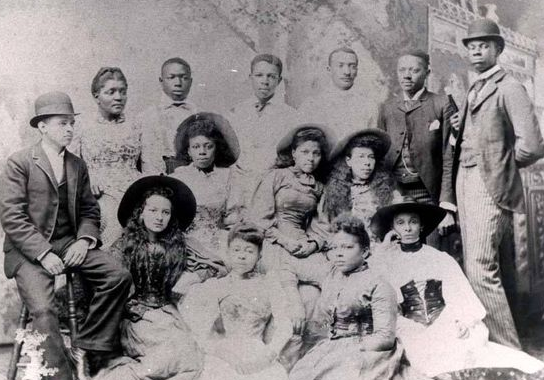The Oriental Opera Company (OOC), established in 1892, was one of the nation’s first all-African American opera and classical music dramatic ensembles. It was founded by Michael Graffe, a white philanthropist from Syracuse, New York. Graffe, who financed the Opera Company for its first year, aimed to demonstrate globally that African Americans had the ability and expertise to sing, interpret, and perform operatic music. White opera companies at that time did not hire Black performers. Twenty years before OOC, however, in 1873, the Colored American Opera Company was briefly established in Washington, D.C., under the direction of John Esputa, a white conductor.
Graffe appointed John Rosamond Johnson, a 19-year-old composer, conductor, librettist, and pianist from Jacksonville, Florida, to lead OOC. Johnson was a musical prodigy at age four and a graduate of Stanton College Preparatory School, Florida’s first school established for African Americans. Johnson also studied piano and voice in 1893 at the New England Conservatory in Boston, Massachusetts.
By 1895, Johnson had gathered leading Black performers at that time to perform with OOC, including principal singer: lyric soprano Eartha Mary Magdalene White, who had studied at the National Conservatory of Music of America in New York City under the tutelage of renowned African American classical composer Harry T. Burleigh. Johnson also invited Desseria Plato, a prima donna mezzo-soprano from New York City who debuted as Azuncena, the gypsy in Giuseppe Verdi’s Il Trovatore opera when it opened at Union Square Theatre in New York. Sidney Woodward, a tenor from Stockbridge, Georgia, who trained at the New England Conservatory, was also hired.
Altogether, Johnson assembled in the OOC three principals and eleven permanently trained singers in the chorus. He often borrowed local church singers for the chorus and instrumentalists for the orchestra. Johnson, however, always conducted from the piano.
In 1896, Johnson, now 23, led the company in a groundbreaking performance at New York City’s Off Broadway Palm Theatre. The company performed excerpts from Verdi’s Aida and Il Trovatore. The two operas were popular, but Aida was significant in the context of African cultural history. Aida is the story of an Ethiopian princess who was enslaved in Ancient Egypt. She is conflicted over falling in love with an Egyptian warrior while remaining simultaneously loyal to her country and her father, who is king. She chooses the warrior and will never again see home. The OOC, led by performances from Eartha Mary Magdalene White, toured for one year across Northern cities in the United States and Europe. At the end of the tour, however, White left the company to return to St. Augustine, Florida, where she graduated from Florida Baptist Academy (now Florida Memorial University).
Johnson’s impact on the short-lived OOC was profound. He was encouraged by White to teach at the Academy and subsequently joined the faculty. Three years later, in 1900, he became famous for composing the music for the Negro National Anthem, “Lift Every Voice and Sing,” while on campus. His brother, James Weldon Johnson, provided the lyrics for the song.
In 1912, Johnson briefly studied piano and composition in London, England, with the Black British composer, violinist, and conductor Samuel Coleridge-Taylor. Regrettably, no films, recordings, or program flyers survive, reflecting any performances of the Oriental Opera Company.
Do you find this information helpful? A small donation would help us keep this available to all. Forego a bottle of soda and donate its cost to us for the information you just learned, and feel good about helping to make it available to everyone.
BlackPast.org is a 501(c)(3) non-profit and our EIN is 26-1625373. Your donation is fully tax-deductible.
“Eartha White, Educator, and Humanitarian born,” https://aaregistry.org/story/eartha-white-a-full-life-of-achievement-and-giving/;
“J. Rosamond Johnson (John Rosamond), 1873-1954,” https://www.loc.gov/item/ihas.200038845;
“Oriental American Opera Company,1892,” http://scholar.library.miami.edu/treasure/chapters/chaptr26.html’

